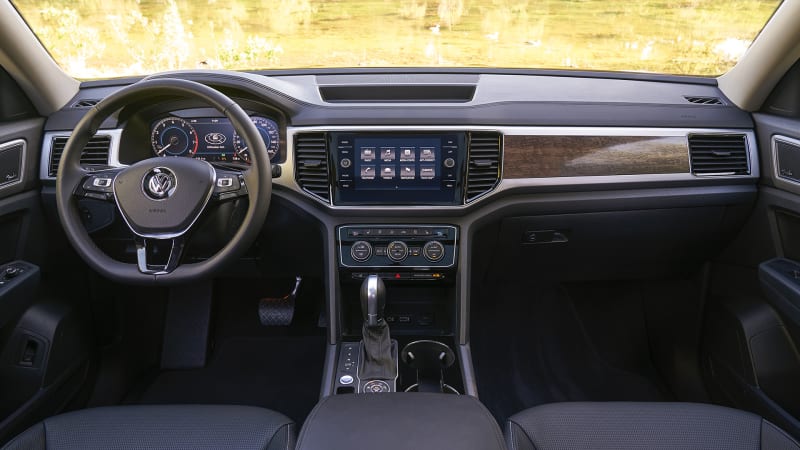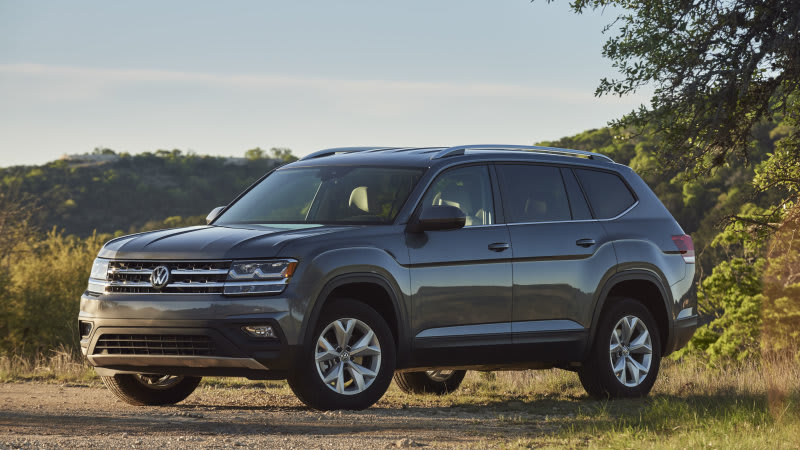2020 Volkswagen Atlas Review & Buying Guide | Das ist huge
https://ift.tt/3a7KU4D
The 2020 Volkswagen Atlas is all about providing the basics. For families in need of a vehicle with tons of space, it delivers in abundance. Each seating row is so spacious that you could comfortably fill the Atlas exclusively with 6-footers, while more of their luggage will be able to fit inside than in virtually every competitor. Despite this size advantage, it’s competitively priced and equipped, providing families great value for the money – especially when you consider that it comes with an extra year of warranty beyond most non-luxury carmakers.
It’s a sensible pick, but certainly not a sexy one (if a three-row family crossover can ever be such a thing). Its sub-par interior quality, dull design, underpowered engines and unusually springy ride stand in contrast to competitors that are genuinely luxurious, snazzy to look at, compellingly powered and/or sharp to drive. As such, we think cheaper trim levels represent the Atlas at its strongest.
What’s new for 2020?
The base 2.0-liter turbo engine is no longer exclusive to the base S trim level. Though still exclusively married to front-wheel drive, it also now comes standard on the SE, SE with Technology and SEL trim levels. In-car WiFi and VW’s next-generation Car-Net remote services technology is now standard, while the “SE with Technology” trim and SEL Premium get bigger wheels. One final update for 2020: Volkswagen’s warranty may be better than more non-luxury brands, but it was actually better last year having been reduced from six years down to four.
Note that the new Atlas Cross Sport debuts for 2020, a five-passenger version similar in concept to Honda’s Passport/Pilot. It’s a separate model, though, so we review it separately.


What’s the interior and in-car technology like?
Interior materials and overall ambiance are disappointing. There is classically austere German design and then there’s just plain – the Atlas falls into the latter category. That’s especially true in the lower trims, but even swapping out the S and SE’s silver plastic accent trim (pictured above right) for the unusual wood-ish substance of the SEL (pictured above left) doesn’t snazz things up enough. The quality of plastics, particularly on the center console, is worse than what you’d find in rival SUVs. Upmarket interiors used to be a Volkswagen trademark. Today, it’s space and value, which might be fine for many shoppers.
In-car technology is a better situation. Even the base Atlas S we tested includes Apple CarPlay and Android Auto plus a touchscreen that’s easy to use and see, if a bit small at 6.5 inches. There’s only one USB port, however. Stepping up to the SE trim adds an extra three USB ports, satellite radio and an 8-inch touchscreen with effectively the same interface as the 6.5-inch one. That’s the infotainment situation for all the upper trim levels, though the SEL does boast the Volkswagen Digital Cockpit that replaces the standard gauge cluster with one digital display. It can simulate regular gauges, or minimize them to show a large navigation map, audio interface or other display.
How big is it?
The Atlas is enormous. Quite simply, if you need more space than this, you really have no choice but to go with a minivan or a full-size SUV like a Ford Expedition. Even the Chevrolet Traverse, which surpasses the Atlas in most dimensions, isn’t so much bigger to really matter.
Like competitors, there is a second-row three-person bench seat available for an eight-passenger capacity or captain’s chairs with a seven-person capacity. We’ve tested examples with the bench, which is 60/40-split and slides further fore and aft than those of competitors. This allows you to bring children in car seats closer to mom and dad, or free up even more third-row legroom. They also allow for a much larger pass through to the third row than other crossovers can manage.
Not only is it easier to get into the Atlas’ third row, it is more spacious once you get back there. As we detail in the video above, someone 6-foot-3 has more than enough head- and legroom in the third row. True, you probably won’t be stuffing NBA point guards back there, but whoever is in the way back will be less cramped and just generally happier.
As for cargo capacity, as you can see in our luggage test video below, the Atlas’ 20.6 cubic-feet of space behind that raised third row allowed us to stow three carry-on roller suitcases, one mid-size check-in suitcase and an overnight bag. None of the other three-row crossovers we’ve luggage tested have matched it. In terms of maximum cargo space with all rows lowered, its 96.8 cubic-feet is only outdone by the Traverse (barely), minivans, and those full-size SUVs.
What’s the performance and fuel economy?
Paired exclusive with front-wheel-drive, the base 2.0-liter turbocharged four-cylinder engine (2.0T) produces 235 horsepower and 258 pound-feet of torque. That output arrives earlier in the rev range, meaning it actually feels a bit quicker off the line than the available V6. It’s also literally quicker than the range-topping SEL, since the SEL’s extra equipment results in a much heftier curb weight. Its fuel economy is average for the segment at 20 mpg city, 24 mpg highway and 22 mpg combined.
The available 3.6-liter V6 (dubbed VR6) can be paired to front- or all-wheel drive, and comes standard on the R-Line trims and SEL Premium. It’s optional on all others. The VR6 produces 276 hp and 266 lb-ft of torque, meaning both available engines are underpowered for the segment. It too gets an eight-speed automatic standard. Fuel economy estimates were curiously not available at the time of this writing, but we can’t imagine it’ll change much (the 2.0T didn’t) from the 2019 figures of 17 mpg city, 24 mpg highway and 19 mpg combined with FWD and 17/23/19 with AWD. Those figures are low for the segment.
What’s it like to drive?
The Atlas doesn’t suffer with the base four-cylinder engine as you’d might expect. Acceleration can actually be quicker than the VR6 model and we found that having less weight to lug around makes the four-cylinder Atlas lighter on its feet and comparatively tossable around corners.
That said, the popularity of all-wheel drive means most Atlas examples you’ll find will have the V6. Its acceleration is never as brisk as you’d find in most competitors and handling is also a bit ponderous, both in comparison to the four-cylinder model and rival SUVs. The steering is at least pleasantly linear in effort and free from the extra-numb on-center feel of other Volkswagens.
As for the ride, it’s very springy. The Atlas bounds and floats over undulations, yet greets manholes and broken pavement with typical Germanic firmness. The extra pounds added by the heavily equipped SEL we tested settles those high seas body motions a bit, but the Atlas’ ride is always excessively soft.
What more can I read about the VW Atlas?
We test the cheapest version of the Atlas: the S trim with front-wheel drive, a four-cylinder engine, cloth seats and few gadgets and gizmos.

We test the priciest version of the Atlas: the SEL with the 3.6-liter V6, all-wheel drive and all the gadgets and gizmos.
Read this to dig deeper into the Atlas’ design and engineering, plus our initial driving impressions.

What features are available and what’s the price?
Pricing for the 2020 VW Atlas starts at $32,565 including the $1,020 destination charge. The 2.0T base engine only comes with front-wheel drive and is standard on the S, SE with Technology and SEL trim levels. The 3.6-liter “VR6” engine is automatically tied to anything with all-wheel drive (AWD), but can be paired with FWD in all but the base S trim.
Standard equipment includes 18-inch alloy wheels, automatic LED headlights, automatic wipers, accident avoidance technologies (see Safety section below), dual-zone automatic climate control, a six-way manual driver seat, cloth upholstery, one USB port, a 6.5-inch touchscreen, Apple CarPlay, Android Auto and a six-speaker sound system. Given the relative dearth of equipment included on the base trim, we’d expect many folks would find the $35,715 SE trim to be the sweet spot. It adds an eight-way power driver seat, simulated leather upholstery, a leather-wrapped steering wheel, proximity entry and push-button start, rear sunshades, four USB ports, an eight-inch touchscreen, an eight-speaker sound system and satellite radio.
You can find a full breakdown of trim levels, features, specs and local pricing here on Autoblog. Base pricing for each trim level is below. Where applicable, the VR6 engine is a $1,400 option, while all-wheel drive adds a further $1,200.
- S: $32,565
- SE: $35,715
- SE w/ Technology: $38,065
- SE w/ Technology R-Line (VR6 only): $41,665
- SEL: $41,815
- SEL R-Line (VR6 only): $45,315
- SEL Premium (VR6 AWD only): $50,215
What are its safety equipment and crash ratings?
Every 2020 VW Atlas comes standard with forward collision warning with pedestrian detection and automatic emergency braking, blind-spot and rear cross-traffic warning, a rearview camera and a typical assortment of airbags. Lane-keeping assist, adaptive cruise control and an automatic parking features are available.
In government crash tests, the Atlas scored a perfect five stars for overall, frontal and side crash protection. The Insurance Institute for Highway Safety gave it the best possible ratings in all crash tests, plus a rating of “Superior” for its frontal crash prevention systems. It fell short of a Top Safety Pick award due to a “Marginal” headlight rating.
Auto Blog
via Autoblog https://ift.tt/1afPJWx
January 13, 2020 at 08:36AM

